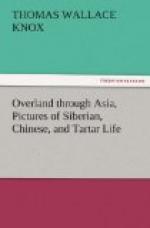People talk politics in Russia with apparent freedom, more so than I expected to find. Men and women expressed their opinions with candor (as I believe,) and criticised what they saw wrong in their government. The Russian journals possess more freedom than those of Paris, and the theatres can play pretty nearly what they like. Official tyranny or dishonesty can be shown up by the press or satirized on the stage more freely and safely than in the country of Napoleon Third, with all its boasted freedom.
I once read a story in which an Englishman in Austria is represented saying to his companion, “No gentleman meddles with the politics of the countries he visits.” I made it my rule in Russia never to start the subject of politics in conversation with anybody. Very often it was started, and I then spoke as freely as I would have spoken in New York. If my opinion was asked upon any point, I gave it frankly, but never volunteered it. I believe the Golden Rule a good one for a traveler. We Americans would think it very rude for a foreigner to come here and point out to us our faults. But for all that, a great many of us visit Europe and have no hesitation in telling the subjects of the various monarchies a variety of impolite truths. During the reign of Nicholas, the secret police was much more extensive than at present. The occurrences of 1825 and subsequent years led to a close surveillance of men in all stations of life. It was said under Nicholas that when three men were assembled, one was a spy and another might be. Doubtless the espionage was rigid, but I never heard that it affected those who said or did nothing objectionable. Under Alexander II. the stability of the throne hardly requires the aid of a detective force, and, if what I was told be true, it receives very little.
The police have a standing order to arrest any person who speaks to the Emperor in the promenade at the Public Garden. One day Nicholas recognized in the crowd a favorite comedian, and accosted him with a few words of encouragement. The actor thanked his majesty for his approval, and the two separated. A stupid policeman arrested the actor, and hurried him to prison on the charge of violating the law.
“But the emperor spoke to me first,” was the apology.
“No matter,” replied the policeman; “you spoke to the emperor, and must be arrested.”
At the theatre that evening Nicholas was in the imperial box, utterly ignorant of what had occurred to his favorite. The performance was delayed, the audience impatient, manager frantic, and the emperor finally sent to know the cause of the curtain remaining down. The actor did not come, and after waiting some time, His Majesty went home. Next morning the prisoner was released, and during the day the emperor learned what had occurred. Sending for the victim of police stupidity, he asked what reparation could be made for his night in prison.
“I beg your majesty,” was the frank request, “never to speak to me again in the Public Garden.”




